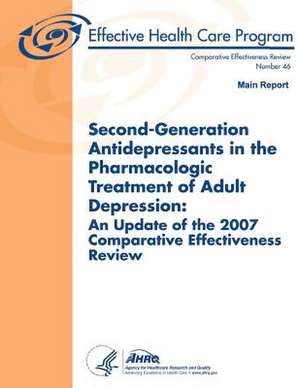Second-Generation Antidepressants in the Pharmacologic Treatment of Adult Depression
Autor U. S. Department of Heal Human Services, Agency for Healthcare Resea And Qualityen Limba Engleză Paperback
| Toate formatele și edițiile | Preț | Express |
|---|---|---|
| Paperback (2) | 162.10 lei 3-5 săpt. | |
| CREATESPACE – | 162.10 lei 3-5 săpt. | |
| CREATESPACE – | 336.53 lei 3-5 săpt. |
Preț: 162.10 lei
Preț vechi: 170.64 lei
-5% Nou
Puncte Express: 243
Preț estimativ în valută:
31.02€ • 33.17$ • 25.86£
31.02€ • 33.17$ • 25.86£
Carte disponibilă
Livrare economică 27 martie-10 aprilie
Preluare comenzi: 021 569.72.76
Specificații
ISBN-13: 9781484871713
ISBN-10: 1484871715
Pagini: 208
Dimensiuni: 216 x 279 x 11 mm
Greutate: 0.49 kg
Editura: CREATESPACE
ISBN-10: 1484871715
Pagini: 208
Dimensiuni: 216 x 279 x 11 mm
Greutate: 0.49 kg
Editura: CREATESPACE
